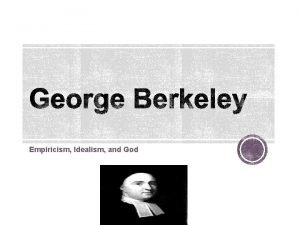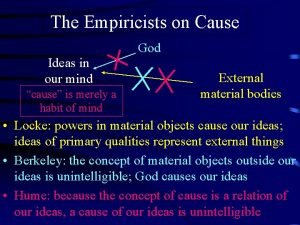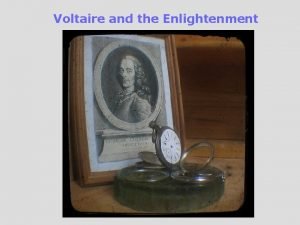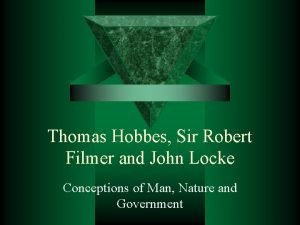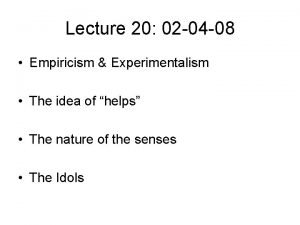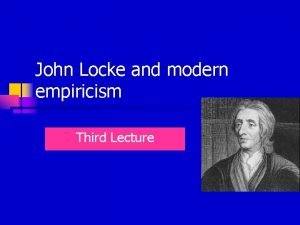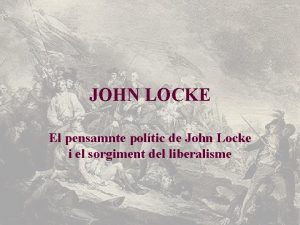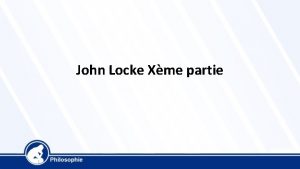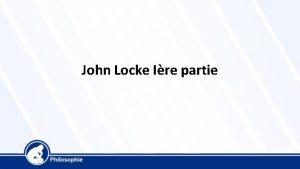Empiricism Idealism and God John Locke holds that















- Slides: 15

Empiricism, Idealism, and God

§ John Locke holds that we construct secondary qualities, but primary qualities are real. § Bertrand Russell argues that such qualities are best explanation of our beliefs. § Either way, perception and qualities are independent. § But as Berkeley says, only perceptions exist. § God perceives everything, all the time. § Therefore, even if our perceptions do not match reality, it is his reality.

§ In his dialogue between Hylas and Phelonous, positions are delcared right away. § Phelonous is Berkeley § In reading a book, what I immediately perceive are the letters; but mediately, or by means of these, are suggested the notions of God, virtue, and truth. Now, that the letters are truly sensible things, there is no doubt. § Phelonous says he need not infer that all is is true. § Instead, God, virtue, etc. , are implied in his very thoughts about them.

§ Hylas, it seems, is John Locke. § Hylas and Phelonous discuss secondary qualities, such as colors, heat, etc. § But as Hylas says § I tell you once for all, that by sensible thing I mean those only which are perceived by sense, and that in truth the senses perceive nothing which they do not perceive immediately, for they make no inferences. § When we secondary qualities, he says, we are really perceiving our own minds. § Again, we must infer the qualities themselves. § Existence is independent.

§ Hylas insists that material objects do not feel pain or pleasure, but can be hot or cold. § But as Phelonous, says, we cannot distinguish these. § Since they are both immediately perceived at the same time, and this affects you with only one simple idea, it follows that this same idea is both the intense heat and the pain. The intense heat perceived is nothing distinct from a particular sort of pain. § Hylas responds that extreme heat exists independently. § But then, he admits that he cannot distinguish between degrees of heat.

§ What about colors? § As Hylas says, we see them on the objects. § But as Phelonous says § But a microscope often discovers colors in an object different from unassisted sight. And we have microscopes magnifying to any assigned degree, it is certain that no object whatsoever viewed through them would appear the same. § Again, animals see colors differently. § So, Phelonous asks, what is the real color? § Colors, it seems, only exist because we are perceiving them, in the way that we do.

§ Phelonous notes that if colors were on objects, they would not change when other things do. § But as he says, colors do change. § Without any alteration in the object itself, the colors of any object change or disappear. The same thing happens in viewing objects in different degrees of light. Add to these the experiments of a prism, which separating the rays of light, alters the colors of objects. § After hearing this, Hylas gives in. § So, he says that secondary qualities have no existence without the mind.

§ Hylas, as noted, is John Locke. § Just as Locke does, he make a distinction between primary and secondary qualities. § So, he notes that § Sensible qualities are divided into primary and secondary. The former are extension, figure, solidity, motion, and the rest. The latter are those above enumerated, or are but sensations existing nowhere but the mind. § Even if we make secondary qualities, primary qualities are independent of us. § Primary qualities are the same for all. § After all, Hylas asks, how could our perceptions matter to such things?

§ Phelonous insists that what goes for secondary qualities goes for primary ones. § Perspective, on this view, should not matter. § But as Phelonous says, it does. § But from what you have laid down, both the extension by you perceived, and that perceived by the mite itself, as likewise all those perceived by lesser animals, are each of them the true extension of the mites foot. By you own standards you are led to an absurdity. § Phelonous insists that this is a contradiction. § Instead, as we approach or recede from an object, the visible extension varies. § Extension, it seems, is also not in the object.

§ Hylas proposes treating all qualities together. § Phelonous dares him to try. § Hylas insists that § What is more easy than of conceiving of objects a tree or house existing alone, independent of, as unperceived by, any mind whatsoever? § Yet what has he really done? § In other words, is his effort anything more than empty words?

§ Phelonous insists that Hylas contradicts himself in a fairly simple way. § In general, the problem is that § When we say trees or houses exist, we are already conceiving of them. § But we cannot then say that, beyond our conceptions, we have still conceived of objects to exist. § Phelonous insists that we only conceive of anything as perceived. § Therefore, nothing exists beyond perception.

§ Hylas and Phelonous, it seems, disagree about what reality is. § Phelonous insists that reality is perception. § To me it is evident, that sensible things are cannot exist otherwise than in a mind or spirit. Whence I conclude, that they have no real existence, bur that seeing that they depend not on my thought, that they there must be some other mind wherein they exist. § Phelonous says that God perceives all. § In other words, God makes things exist, just by desiring that they do.

§ As Phelonous says, if God perceives all, we already know that he exists. § It follows that proofs of God are irrelevant. § You may now, without any laborious search into the sciences, without any subtlety of the reason, and without tedious length of discourse, oppose and baffle the most strenuous advocate for atheism. § When we look into our own thoughts, we know. § If atheists disagree, Phelonous says, they will be lead to contradict themselves.

§ Hylas asks about illusions. § Why does God allow us fall into error, and how can we tell the difference? § First, Phelonous says § The ideas formed by the imagination are faint and distinct; they have, besides, a dependence on the will. The the ideas formed by the senses, that is, real things, are more vivid and clear, and are imprinted on the mind by a spirit distinct from our will. § Second, illusions are confused, but sensory ideas are connected to our lives. § But these two points are quite irrelevant. § After all, Phelonous ignores the possibility that perhaps God wants us to make errors

1. Locke and Russell might have been correct about separating primary and secondary qualities. 2. As Russell says, it seems fallacious to move from X is a sensible object X exists only when it is sensed, or is in the mind. 1. 2. If empiricism is true, Berkeley cannot postulate a spirit who makes object exist 3. Empiricism says all ideas come from sense. Yet, this spirit is a theory, and not derived from sense. 1. 2. 1. 4. After all, some other spirit may make things exist. If God makes objects all the time, he would be responsible for all evil.
 Locke primary and secondary qualities
Locke primary and secondary qualities Empiricism and god
Empiricism and god 3 metal bars with riders for 100s, 10s, and 1s measurement
3 metal bars with riders for 100s, 10s, and 1s measurement Phân độ lown
Phân độ lown Block nhĩ thất độ 2 mobitz 2
Block nhĩ thất độ 2 mobitz 2 Thể thơ truyền thống
Thể thơ truyền thống Thơ thất ngôn tứ tuyệt đường luật
Thơ thất ngôn tứ tuyệt đường luật Walmart thất bại ở nhật
Walmart thất bại ở nhật Tìm vết của mặt phẳng
Tìm vết của mặt phẳng Con hãy đưa tay khi thấy người vấp ngã
Con hãy đưa tay khi thấy người vấp ngã Tôn thất thuyết là ai
Tôn thất thuyết là ai Gây tê cơ vuông thắt lưng
Gây tê cơ vuông thắt lưng Sau thất bại ở hồ điển triệt
Sau thất bại ở hồ điển triệt How did voltaire
How did voltaire Hobbsian
Hobbsian Empiricism and experimentalism
Empiricism and experimentalism
